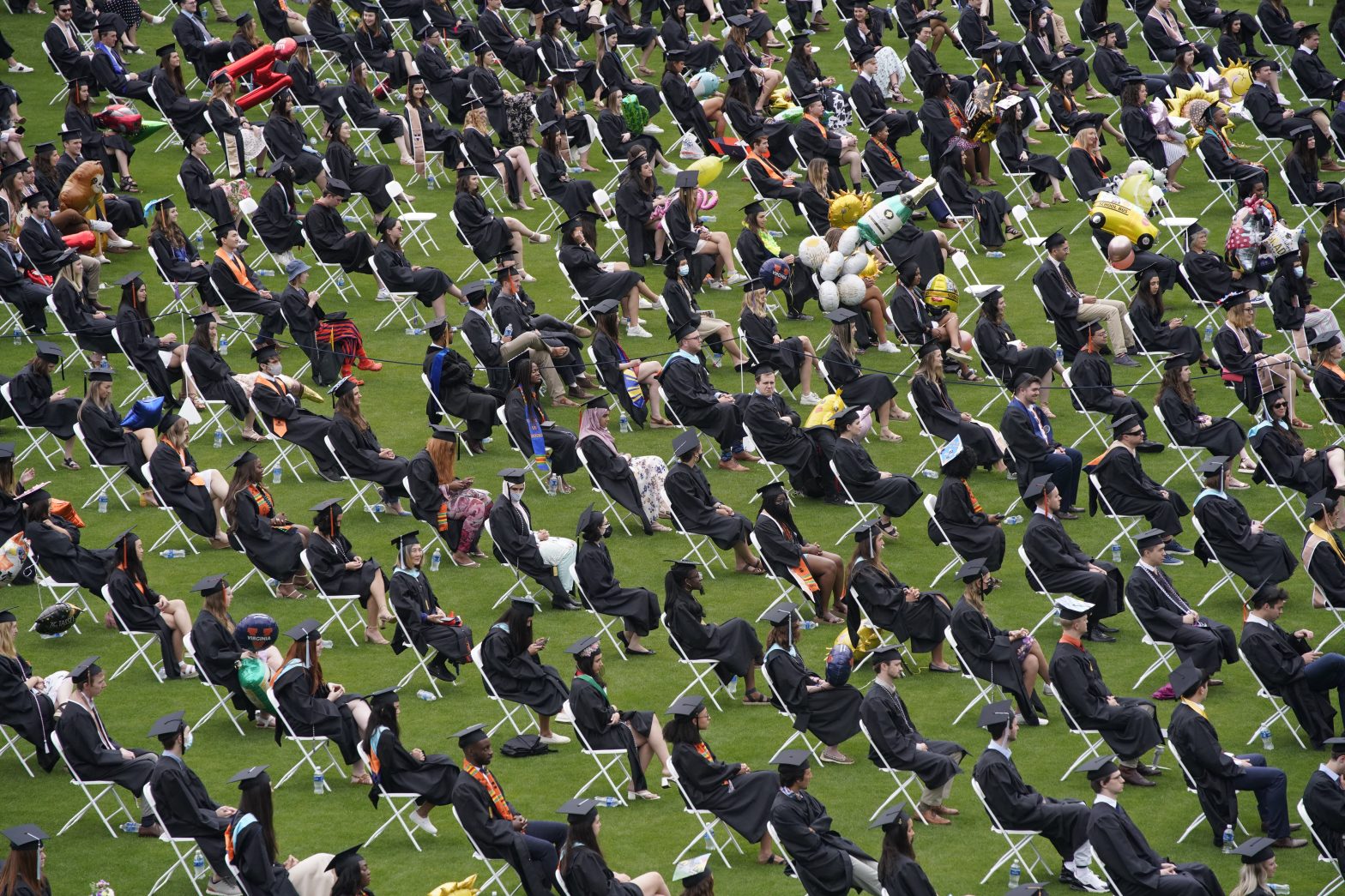My redo graduation got off to a less-than-graceful start.
The day before walking, I found my black gown not in my closet, but crumpled in the trunk of my car, where I dumped it a year ago after declaring my 2020 graduation a total loss. My cap was nowhere to be found, and I ran to the bookstore 10 minutes before the ceremony began. My student identity, like the gown, didn’t fit quite as well as it had a year ago.
I never left Charlottesville, even after “officially” graduating as part of the Class of 2020. In March of last year, after UVA moved all classes online, my friends left their apartments for hometowns across the country. It was a slow trickle of loss, a kind of bizarre un-reality that would come to characterize the entire pandemic. The brain, being the amazing adaptive muscle that it is, weaved different stories for me. My friends weren’t gone, they were just leaving for a few weeks. Classes weren’t stalled, it was just a nice spring break extension.
This surreal feeling persisted through my class’ virtual graduation last May, when Yo-Yo Ma played the cello and Jim Ryan congratulated some 4,000 of us undergraduates for finishing college. The feeling lasted through the winter, when the U.S. announced 500,000 deaths from COVID-19. This new world, steeped in a pervading feeling of existential loss and crushing anxiety, could not have been the same world where I was once a carefree college undergraduate.
This spring, UVA announced it would hold a distanced graduation for us in May, a year after I had officially graduated from college. (The Class of 2021 will have its regularly scheduled ceremony this weekend.)
I wasn’t sure about returning. I felt too old now to walk the Lawn, too jaded to buy balloons. I had, after all, started a full-time reporting job, survived a round of harrowing job cuts, watched rioters besiege the U.S. Capitol, and saw a virus rip through the world. My entire graduating class had witnessed these things too, while also being expected to put on its new adult shoes, abandon the naiveté of young adulthood, and face the grim facts. What would we say to each other when we finally came face to face?
The year in near-isolation left me unprepared for the shock of friendship and love that I felt when I saw old friends emerge from the crowd of students in Mad Bowl last Sunday morning. The shared grief and responsibility that I feared would divide us, instead brought us nearer to each other. We joked about virtual work, the pressures of graduate school, this bizarre late graduation.
The empty Lawn, which in a normal year would have been packed full on all sides, was funnier with my friends there. Had we ever really aspired to that suffocating old graduation ritual? Instead of desperately looking over the lines to spot familiar faces, we turned to each other and laughed at the ridiculousness of it all. When it started to rain, we noted that the rotten weather was appropriate for our class’ luck, and we smiled.
If friends made the more-lonely walk from the Lawn to Scott Stadium fun, the parents and loved ones waiting in the stadium made our day. Each student was allowed two guests. Parents waved from around the stadium, desperate to get a look at their children. Students surreptitiously nudged socially distanced chairs closer to their friends. My friend Tori spotted her dad, whose grin threatened to split his face as he raised his camera to get a picture of her. Though everyone sat far apart, the quiet of the sparsely populated space gave the ceremony a certain intimacy. Families didn’t scream. There was no need. They leaned over banister railings, and waved from their seats.
“I’m so proud of you,” I overheard one parent say to a passing graduate. I spotted my own parents on the upper level. They jumped up and down.
The collected speakers were reluctant to address the full seriousness of the pandemic and what it had done to us. We were sitting here, after all, because of an unprecedented worldwide tragedy, and I couldn’t help thinking of patients dying alone on ventilators in hospital rooms, and dead bodies piled in refrigerator trucks in New York as Jim Ryan joked about apocalyptic cicadas and gas shortages. Some of the usual graduation clichés predictably rang hollow.
Unexpectedly, the most resonant speech came from Rector James Murray Jr., who graduated from college in 1968 during the peak of the Vietnam War and the aftermath of Martin Luther King Jr.’s assassination. “Life throws many curves,” he said. “Time goes quick, quicker than ever.”
When the ceremony ended and we streamed out of the stadium, it felt like a chapter had finally been closed. Not because I got to put on my gown, or because I walked down the Rotunda steps, but because I had a chance to say goodbye to my friends on my terms—and because we cared enough to come back together, and try again.
